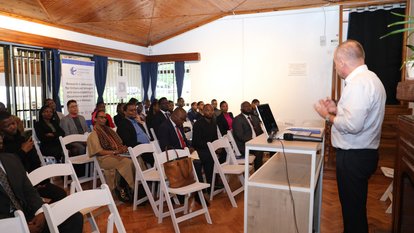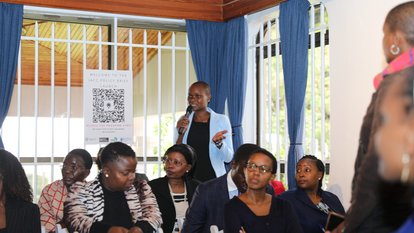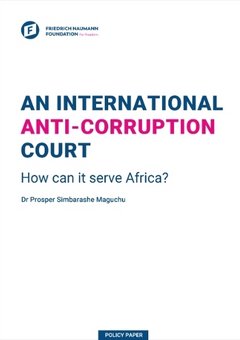Africa Must Lead
Chief Justice Koome backs International Anti-Corruption Court at FNF launch

A re-enacted image of a person 'refusing' to take a bribe.
© ShutterstockThe Friedrich Naumann Foundation for Freedom Sub-Saharan Africa and Kenya (FNF) yesterday launched a landmark Policy Brief on the proposed International Anti-Corruption Court (IACC), igniting a high-level regional dialogue on how the court could help tackle grand corruption and kleptocracy in Africa.
The event, held at FNF’s Nairobi office, was convened in partnership with Transparency International Kenya, Integrity Initiatives International (III), and Good Governance Africa (GGA). It brought together legal experts, civil society leaders, and policymakers to assess the IACC’s potential to strengthen accountability, recover stolen assets, and fortify the rule of law across the continent.
In her keynote address, Chief Justice Martha K. Koome delivered a passionate defence of the IACC concept, saying:
“Corruption is one of Africa’s greatest threats… It has weakened institutions, stolen futures, and robbed us of our human dignity.”
Koome highlighted the limitations of domestic systems in tackling transnational corruption, especially where institutions lack jurisdiction, capacity, or political will.
“Often, the perpetrators of these heinous crimes are senior officials who siphon off funds to offshore accounts,” she said. “An international anti-corruption court is not just timely—I dare say it is necessary.”
The Policy Brief argues that the IACC could act as a complementary mechanism intervening only when national systems fail to prosecute serious corruption cases. Crucially, it also advocates that Africa should not be a passive recipient of global justice but a co-creator of international solutions.
“Africa must not stand on the periphery… Africa must be at the centre,” Koome urged. “We can reflect African legal traditions, including restorative justice and ubuntu, in shaping the court’s character.”

International Anti-Corruption Court policy brief launch guests and participants take a group picture outside the FNF office in Nairobi.
© Friedrich Naumann Foundation for Freedom
FNF East Africa director, Stefan Schott welcoming the guests to the IACC policy brief launch
© Friedrich Naumann Foundation for Freedom
Dr. Prosper Maguchu launching the IACC policy brief.
© Friedrich Naumann Foundation for Freedom
Guests get an opportunity to share their thoughts on the IACC policy brief.
© Friedrich Naumann Foundation for Freedom
Justice Key Dingake gives his keynote address virtually at the launch of IACC.
© Friedrich Naumann Foundation for FreedomFNF describes the briefing as a bold contribution to global justice architecture, one aimed at reversing the systemic impunity that continues to erode democracy and development across Africa. The foundation underscored the importance of including a wide array of stakeholders from judges and think tanks to regional bodies and victims of corruption.
The event coincided with the National Authority for the Campaign Against Alcohol and Drug Abuse (NACADA) launching a community-based rehabilitation framework for substance use disorders at the Kenya Institute of Curriculum Development (KICD) earlier this morning.
As debates around international justice mechanisms gain momentum, the discussions at the launch marked a turning point, calling for African leadership in building a world where, as Koome concluded, “no one is above the law.”

